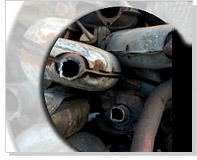 Scrap catalytic converters contain some of the most expensive metals on the planet - metals that never wear out, even if the converter stops functioning and must be junked. Since 1975, every vehicle sold in the US and Canada is literally a "platinum mine" on wheels that can eventually be replaced. Thousands of converters are substituted daily (Once Ford announced the recall of 680,000 converters - all of which became available as scrap) and tens of thousands of cars are going to junk yards with their treasured, platinum-loaded converters intact. The profit potential in this industry is huge with EPA prohibiting the resale of these catalytic converters.
Scrap catalytic converters contain some of the most expensive metals on the planet - metals that never wear out, even if the converter stops functioning and must be junked. Since 1975, every vehicle sold in the US and Canada is literally a "platinum mine" on wheels that can eventually be replaced. Thousands of converters are substituted daily (Once Ford announced the recall of 680,000 converters - all of which became available as scrap) and tens of thousands of cars are going to junk yards with their treasured, platinum-loaded converters intact. The profit potential in this industry is huge with EPA prohibiting the resale of these catalytic converters.
The catalytic converters designed in vehicles function as a primary mode for reducing the emissions of air pollutants. These converters contain Platinum Group Metals, just like the ceramic ones and the recycling companies specialize in recovering these values and paying cash for the automobile catalytic converters.
The catalytic converters have also found uses in generator sets, mining equipment, forklifts, buses, trucks, trains, and other engine-equipped machines.
Some of the important types of catalytic converters include -
- Gasoline Catalytic Converters
- Diesel Catalytic Converters
- Pellet (Ceramic Bead) Converters
- Monolith (Honeycomb) Converters
- Two- way Converters
- Three-way Converters
- Three-way + Air Converters
Why Recycle the Scrap Catalytic Converters?
By recycling the scrap catalytic converters, we are doing our part to save the planet. These converters use a variety of precious metals, including - platinum, palladium and rhodium a substantial portion of which are mined in areas with a lack of environmental protection legislation, causing substantial negative environmental effects.
ProcessThe scrap catalytic converters are usually classified and graded as like all other catalysts. The general grading system defines three major categories, with unit prices for every category and size. These three major categories include -
- Smaller and "pre" type units
- Smaller foreign units and large Chryslers
- Higher grade European and Japanese convertibles
Call the recycling company. Pick-up and transportation is generally arranged by them. They even supply packaging materials, if required.
Once the converters reach the processing facility, they are immediately counted and graded. Based on the existing market prices for platinum, palladium and rhodium, a purchase offer is offered.
Types / GradesVarious varieties and grades of catalytic converter scrap are used for recycling purposes and to recover precious metals from the scrap. Given in the table below are some of the important grades / types of catalytic converter used in recycling -
|
Some other important grades of scrap catalytic converters, include - scrap converter (Small GM), scrap converters (diesel converter), scrap converters (American pre-converter), scrap converters (European pre-converter), scrap converters (after market), scrap converters (foils / wraps), loose bead material and loose honeycomb material.
